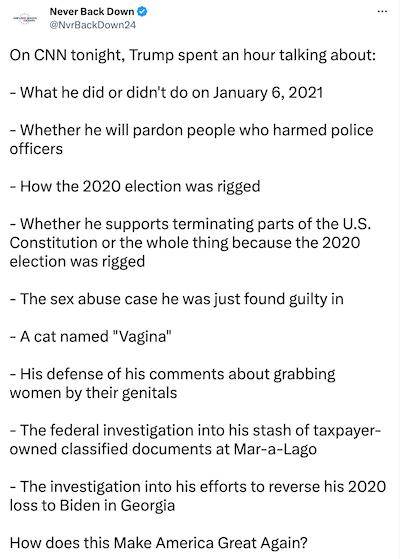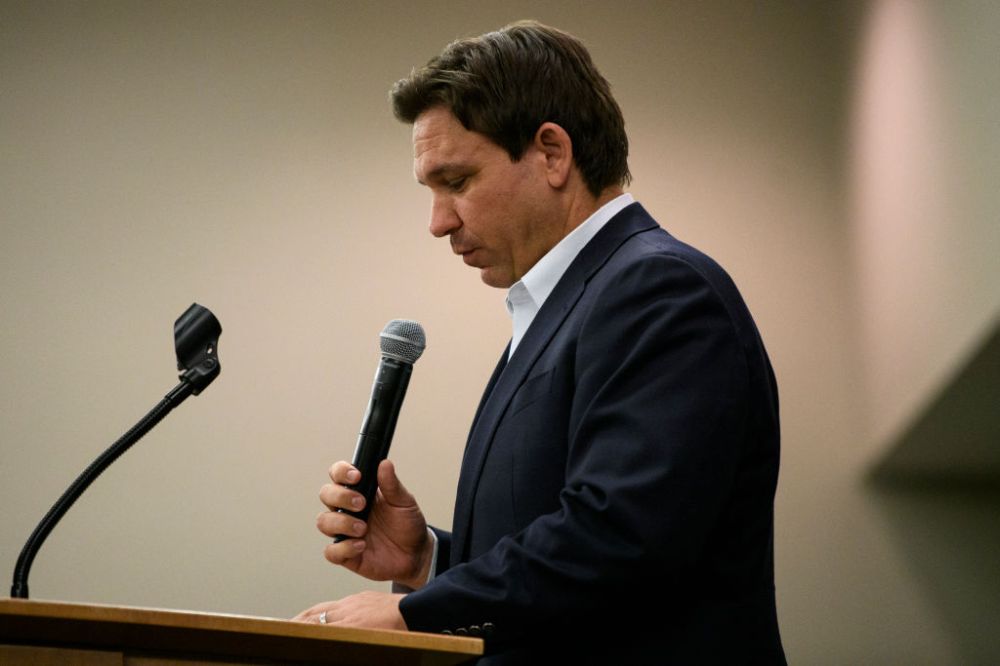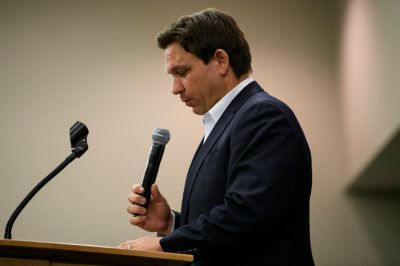Yesterday my boss paused for a perspective check about the most provocative passage from an unusually provocative legal complaint, one accusing Rudy Giuliani of sexual assault.
We won’t hear that allegation mentioned in the coming primary, of course, for the simple and obvious reason that Republican voters would resent the candidate who brought it up more than they’d resent Trump for the behavior it describes.
“But wait,” you might say. “Republican voters love a ‘fighter.’ Wouldn’t they respect a Mike Pence or a Nikki Haley for getting in Trump’s face about this?”
Uh, no—although it is true that you can’t get anywhere with Republican voters if you’re not eager to “fight.”
Being perceived as a “fighter” is easily more important than holding conservative views on policy in 2023, which is how we ended up with a presidential frontrunner who’s 30 points ahead despite opposing entitlement reform and strict abortion bans.
But what qualifies a candidate as a “fighter” is complicated. It’s not just a matter of displaying fearlessness in confronting one’s opponents. It’s more than unapologetic pugnacity in service to right-wing causes. To qualify as a “fighter,” you need to channel the Republican base’s insatiable contempt for its cultural enemies.
Demonstrating contempt for Trump, as Pence or Haley might theoretically do in the scenario I imagined, would be the opposite of that.
Which brings us to Ron DeSantis’ super PAC.
Last Wednesday, after Donald Trump’s live town hall with CNN, the “Never Back Down” PAC tweeted this commentary on the event.

Right-wingers of all stripes found that tweet audacious, and for similar reasons. It wasn’t the fact that a DeSantis outfit would dare to attack Trump, as attacks will be par for the course once the governor officially enters the race. (Although, given the pitiful timidity of Haley and Vivek Ramaswamy in refusing to say an unkind word about Trump, you’re forgiven for doubting that.) It had to do with where the attack was focused.
January 6. “People who harmed police officers.” Myriad personal scandals, some with legal complications. Trying to overturn his “loss” in Georgia.
Each of those involves some grave moral failing of Trump and therefore, to Republican voters, is something only a Democrat would care enough to mention. The team at Never Back Down would doubtless reply that they didn’t endorse the substance of any of the critiques, they merely noted how much time Trump spent relitigating them at the CNN event instead of advocating for right-wing policies. But for DeSantis to even call attention to them, implying that Republican voters should take note of them in any way, was an affront to populism so grave that it risked calling his credibility as a “fighter” into question.
The governor’s team wasn’t channeling the base’s contempt for the left with its tweet, it was channeling the left’s entirely justified contempt for Trump. According to Semafor in a piece cheekily titled “Sometimes Back Down,” Never Back Down quickly recognized it as a significant misstep.
The tweet generated some heated internal pushback at Never Back Down, while multiple prominent conservative commentators piled on publicly.
One DeSantis ally familiar with their thinking told Semafor that the group’s leadership “100%” recognized it as an error. A second source familiar with the situation added that they were told the tweet was sent without the approval of the PAC’s senior communications team.
“That post was a massive mistake,” the first ally said. “It sounded like it came from CNN, and I think people inside realized that that was a massive mistake, and I hope it won’t be repeated again.”
A spokesman for Never Back Down called the report “false.” But then they would, wouldn’t they?
The terrible truth is that Trump is so morally and civically depraved that the right at some point gave up trying to reconcile its allegiance to him with its conscience, recognizing that it couldn’t be done. It would need to choose between the two and so it did, resolving that any qualms about his personal fitness for office were proof of left-wing sympathies. To protect its political investment in him, the GOP has declared moral bankruptcy. That’s how we ended up with even his primary opponents treating mentions of the insurrection or sexual abuse as “sounding like CNN.”
This raises a strategic question. Is Team DeSantis right or wrong to (allegedly) regret sending that tweet?
I think they’re right. They shouldn’t have sent it.
Why DeSantis wants to lead a party that consists mainly of people who admire Donald Trump, many of them ardently, I can’t fathom. It must be a matter of raw ambition, spying an opportunity to win the presidency and not caring much about which civic compromises might need to be made to maximize his chances.
His mainstream apologists might say that DeSantis wants to oust Trump so that he can take the GOP in a healthier direction. (His less mainstream apologists would say the opposite, that he’ll deliver authoritarianism unencumbered by Trump’s personal foibles and incompetence.) I’m skeptical—DeSantis is only too eager to indulge the right’s worst impulses—but either way, making a morally “healthy” case against Trump in the primary would almost certainly fail even if the governor were willing.
After all, mirroring Trump’s own sense of amorality about his behavior has become a litmus test of right-wing authenticity. Republicans who fail it are almost invariably tossed out of office. Insofar as Never Back Down’s tweet intimated that MAGA populists should feel ashamed of him–and by extension of themselves for what they’ve tolerated in the name of blind loyalty–it’s borderline unforgivable.
If DeSantis wants to lead this miserable party, he’ll need to respect the rules of its own perverted internal morality and avoid such critiques going forward. That’s been my position since December and it’s my position now. I sympathize with those who disagree because they crave the catharsis of seeing Trump righteously shamed on a Republican debate stage, but it won’t work. There are no better angels left to appeal to in the nature of this primary electorate.
They sacrificed them all for the chance to renominate a guy who thinks it’d be a good idea to have Mike Flynn and Jeffrey Clark back in the government.
But that presents another problem. By declining to criticize Trump on moral grounds in order to preserve his credibility as a “fighter,” DeSantis is risking that credibility in a different way. He’s in jeopardy of being publicly dominated by Trump.
Trump has already attacked the governor’s own morals viciously, insinuating that he might have preyed on teenagers when he taught high school as a younger man. Rumors have circulated that he’ll eventually attack DeSantis’ wife too, a tactic he used to emasculate Ted Cruz during the 2016 primary. When he does, DeSantis will probably try to take the high road by insisting that responding to such smears is beneath him.
That won’t work either. Right-wingers have been conditioned by their adulation of Trump to admire spectacles of dominance, which is why the idiots around him at Mar-a-Lago were gleeful about his CNN town hall instead of worried about the many general-election liabilities he created for himself. They recognized, correctly, that Trump dominating an “enemy” network for an hour with little resistance would impress Republican primary voters. By the same logic, Trump dominating DeSantis with nasty personal attacks during the primary with little resistance might lead those voters to conclude that the governor turns out not to be much of a “fighter” when he’s facing an opponent more formidable than Charlie Crist.
And if you’re reading that and thinking “the deck seems to be stacked here, with Republican voters eager to view DeSantis as too aggressive or too timid as Trump’s political needs warrant”: Well, yes.
The politics of dominance get tricky when it comes to the governor’s ace in the hole, his alleged electability advantage over Trump. (Compare their respective polling against Biden and you’ll see why I include the word “allegedly.”) Here was DeSantis on Saturday night in Iowa, speaking pointedly—but not too pointedly.
You and I know who he’s talking about. But he couldn’t bring himself to be specific.
Yesterday he was asked whether he thought Trump lost the 2020 election. Again he chose his words with care, declining to commit.
How do you make an electability argument against a guy who insists that he won the election if you’re afraid to actually make the argument?
Philip Klein is right that DeSantis will eventually formulate some too-clever-by-half solution to this problem. “Maybe you lost fair and square or maybe you were cheated, but either way you got rolled by Democrats,” he’ll say to Trump. In theory that would satisfy all sides of the party, the conspiracy theorists who’d rule out a candidate for legitimizing Biden’s victory and the sane Republican rump who’d rule out a candidate for legitimizing Trump’s paranoia.
But in practice it might satisfy no one. Trumpers and anti-Trumpers alike may view DeSantis’ unwillingness to take a firm stance as weak and unsatisfying, further evidence that he’s been cowed by Trump’s dominance. Especially once Trump offers the inevitable retort: “If you still don’t know whether I was cheated, Ron, you’re the last guy we should trust to stop Democrats from doing it again.”
Even more confounding for DeSantis is the possibility that another candidate will forthrightly accuse Trump of having lost in 2020 and then parlay that into attacking the governor himself for failing to do so. It’s trivially easy to imagine Chris Christie making a splash at a debate by telling Trump that he got beat like a mule by a barely coherent 78-year-old, then turning to DeSantis to call him a pitiful wimp who knows the truth but lacks the basic manhood to admit it.
For reasons I’ve explained, DeSantis’ amoral silence in that situation is probably the correct strategic decision. But the more timid he looks in ducking opportunities to confront Trump, the more skeptical of him Republican voters craving demonstrations of dominance by their nominee may become. The governor is damned if he does and damned if he doesn’t, caught between two pernicious yet somewhat conflicting impulses among the electorate he’s about to face.
Have I mentioned yet how mystifying it is that he wants to lead this pathetic movement?
DeSantis is going to end up gambling his candidacy on a dubious proposition, that a party which currently betrays not a lick of serious interest in policy will be willing to oust its leader in response to a strong policy critique.
Policy is the one battlefield on which DeSantis might plausibly “fight” Trump without disqualifying himself because it’s a rare facet of politics in which Trump’s own credentials as a “fighter” aren’t impeccable. If being a “fighter” is all about channeling the right’s cultural contempt for the left, who better fits the description? A guy who just signed a six-week ban on abortion with no apologies or a guy who thinks that’s “too harsh”?
Trump didn’t secure the border. Trump endorsed lockdowns. Trump got muscled by the “deep state.” Trump failed to end “endless wars.” There are numerous policy disappointments to exploit, assuming DeSantis can get Republican voters to give them a fair hearing amid Trump’s vehement disingenuous denials. Which, according to the New York Times, is precisely the strategy the governor plans to pursue.
That could change hearts and minds, I suppose. Trying to convince the American right after eight years of madness that, no no no, it’s Trump who’s the actual RINO, is … a strategy, all right. But is it a sound one?
For one thing, Trump is closer to the modern Republican base on some issues than DeSantis is. Eighty-four percent of the party opposes cuts to Social Security and Medicare, a position in line with Trump’s but not so much in line with DeSantis’ record as an ardent entitlement reformer during his congressional career. Trump is also obviously the more sincere dove of the two, a better fit for the GOP when support for aid to Ukraine has slipped below 50 percent among its voters.
Even the six-week abortion ban DeSantis signed in Florida may not be the overwhelming winner for him in a primary that he assumes it is. One poll published last month found 40 percent of Republicans in favor of legal abortion through the first trimester. If Trump were to get behind that idea, the implicit permission it would create for other right-wing voters to moderate their views on the subject if they so desire might raise the percentage even higher.
Meanwhile, as DeSantis goes about presenting himself as a model of uncompromising right-wing principle relative to Trump, he could end up seeming less principled himself relative to certain other candidates on his own right flank.
His biggest challenge in making a policy case against Trump, however, is the Republican base’s belief that its hero cannot fail, he can only be failed. It’s not Trump’s fault that the wall wasn’t finished, it’s Paul Ryan’s. It’s not his fault that the Trump White House supported lockdowns, it’s Anthony Fauci’s. It’s not his fault that the DOJ didn’t lock up his enemies, it’s Bill Barr’s and Chris Wray’s. It’s not his fault that we didn’t withdraw from Afghanistan, it’s Mark Milley’s.
And it’s not his fault that he hired or made allies of all of those people, only to be betrayed by each of them. Washington is a swampy place, teeming with treacherous establishmentarians. That’s why he needs a second term, to finish the job and exact “retribution.”
He’ll dominate his enemies next time, like any proper “fighter” would. Not like Ron DeSantis, who’s afraid to say his enemy’s name.
I’m not optimistic about the governor’s chances anymore, as much as I appreciate the cynical strategic wisdom of some of his choices. To believe that he can win, one needs to believe that Republican voters idolize Trump not because of his viciousness but in spite of it. I don’t believe that. They’ve been morally corrupted by him to the point that there’s no way to lure them away except by evincing more personal and political cruelty than their leader does. Tucker Carlson might be able to do it but DeSantis can’t. And I shudder to think what he’d be like as president if it turns out that he can.







Please note that we at The Dispatch hold ourselves, our work, and our commenters to a higher standard than other places on the internet. We welcome comments that foster genuine debate or discussion—including comments critical of us or our work—but responses that include ad hominem attacks on fellow Dispatch members or are intended to stoke fear and anger may be moderated.
With your membership, you only have the ability to comment on The Morning Dispatch articles. Consider upgrading to join the conversation everywhere.